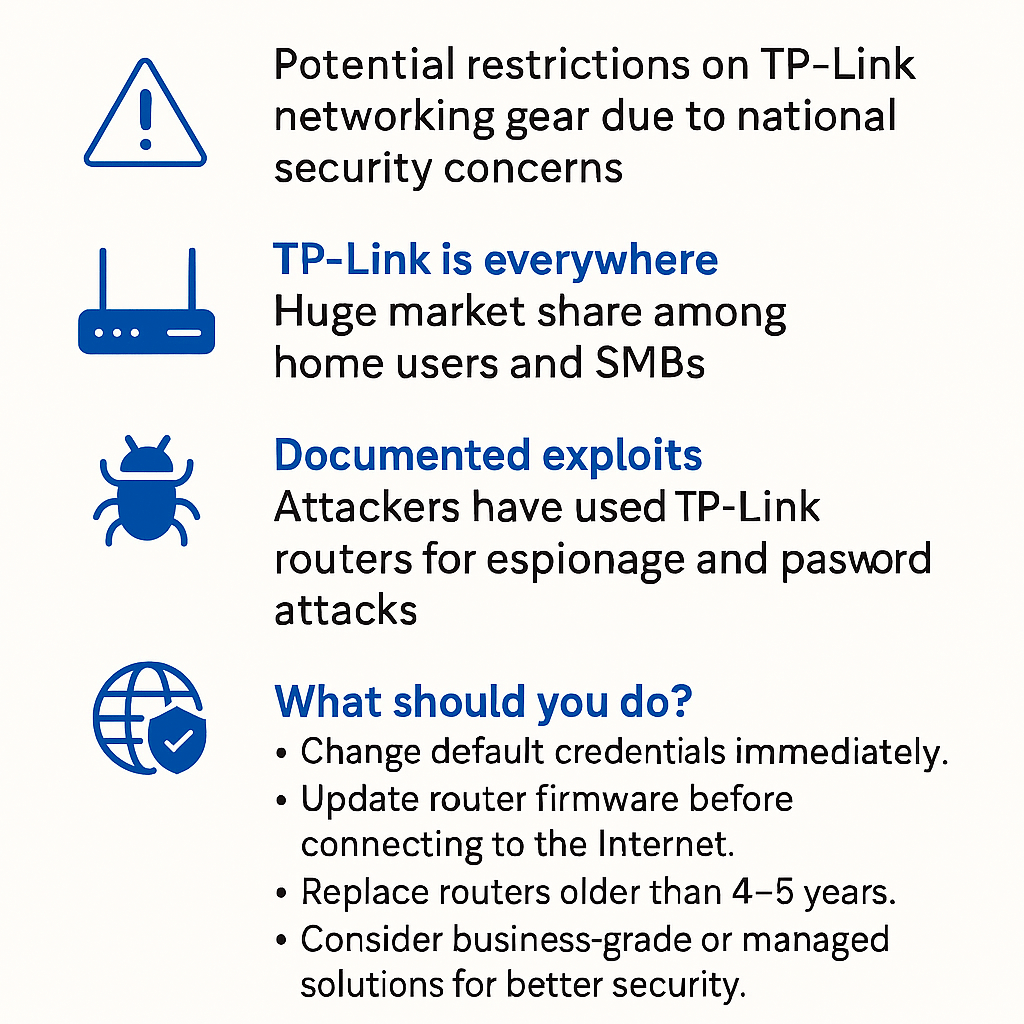Recently, the U.S. government has been contemplating placing restrictions on TP-Link’s networking equipment. Some of the equipment the government plans to place restrictions on includes routers, according to a recent report from KrebsonSecurity. While TP-Link addresses these allegations, this potential security hazard underscores a growing reality for businesses: network hardware security is now more important than ever.
Why This Matters
1. TP-Link’s Widespread Use
TP-Link is currently being used in a significant amount of both the home and small-to-medium business (SMB) networking markets. Many people rely on TP-Link routers and access points to attain both affordability and performance, but this also makes TP-Link a large target for cybercriminals.
2. Documented Exploits
Within the past couple of years, TP-linked devices have been. Targeted in several cyber and espionage attacks. Cyber criminals have been able to exploit outdated firmware and insecure credentials to obtain unauthorized access to networks. These vulnerabilities aren’t unique to TP-Link, but given TP-Link’s popularity, they’re frequently under scrutiny.
3. An Industry-Wide Problem
Consumer-grade routers across all brands often share the same weaknesses:
- Default or weak passwords left unchanged after setup
- Outdated firmware that never receives security updates
- Unsupported models that no longer receive patches
When these devices connect directly to a business network, they create potential entry points for hackers, putting sensitive data and systems at risk.
What You Should Do Right Now
If your organization — or your home office — uses TP-Link or any consumer-grade router, here are proactive steps you can take today:
- Change Default Credentials
- Never leave factory default usernames and passwords in place. Use long, unique credentials for both admin and Wi-Fi access.
- Update Firmware Regularly
- Before connecting a router to the internet, make sure it’s running the latest firmware. Set a quarterly reminder on your calendar to check for updates.
- Replace Outdated Equipment
- Routers older than 4–5 years often lack current security features and may no longer receive patches. Replacing them reduces your attack surface dramatically.

Upgrade to Business-Grade or Managed Solutions
Managed or enterprise-grade routers offer centralized management, automatic updates, and enhanced security controls. These types of routers are especially valuable for businesses with remote workers, branch offices, or sensitive client data.
For Tech-Savvy Users:
Advanced users can explore more options, such as installing open-source firmware like OpenWrt or DD-WRT for extended device life and improved control. This option requires technical expertise and ongoing maintenance.
How Byte Solutions Can Help
At Byte Solutions, we specialize in helping businesses secure, monitor, and modernize their networks. Whether you need a router audit, a hardware upgrade plan, or fully managed network services, our team ensures your systems are optimized for both performance and protection.
Don’t wait until a vulnerability becomes a breach. Contact us at Byte Solutions to schedule a network security assessment today.